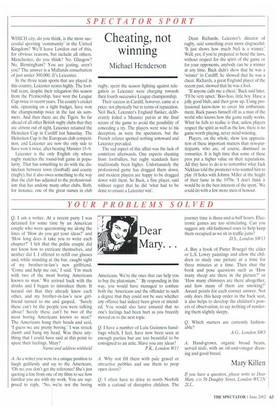Cheating, not winning
Michael Henderson
WHICH city, do you think, is the most successful sporting 'community' in the United Kingdom? We'll leave London out of this, for obvious reasons, but include all others. Manchester, do you think? No. Glasgow? No. Birmingham? You are jesting, aren't you? The answer is a Midlands conurbation of just under 300,000. It's Leicester.
In the three team sports that are played in this country, Leicester scores highly. The football team, despite their relegation this season from the Premiership, have won the League Cup twice in recent years. The county's cricket side, operating on a tight budget, have won the championship twice in the last six summers. And then there are the Tigers. So far ahead of all other British rugby clubs that they are almost out of sight, Leicester retained the Heineken Cup in Cardiff last Saturday. The Heineken Cup is the European club competition, and Leicester are now the only side to have won it twice, after beating Munster 15-9.
Leicester is the only English city where rugby matches the round-ball game in popularity. That has something to do with the distinction between town (football) and county (rugby), but it also owes something to the way that the club has adjusted to the professionalism that has undone many other clubs. Bath, for instance, one of the great names in club rugby, spent the season fighting against relegation as Leicester were charging towards their fourth successive League championship.
Their success in Cardiff, however, came at a price: not physically but in terms of reputation. Neil Back, Leicester's England flanker, deliberately foiled a Munster put-in at the final scrum of the game to avoid the possibility of conceding a try. The players were wise to his deception, as were the spectators, but the French referee spotted nothing untoward and Leicester prevailed.
The sad aspect of this affair was the lack of contrition afterwards. One expects cheating from footballers, but rugby standards have traditionally been higher. Unfortunately the professional game has dragged them down, and modern players are happy to be dragged down with them. So Back, a fine player, said without regret that he did 'what had to be done to ensure a Leicester win'. Dean Richards, Leicester's director of rugby, said something even more disgraceful: 'It just shows how much Neil is a winner.' Well, yes; if you're prepared to bend the laws, without respect for the spirit of the game or for your opponents, anybody can be a winner at any time. Back didn't show that he was a 'winner' in Cardiff, he showed that he was a cheat. Richards, a great England player of the recent past, showed that he was a fool.
'If anyone calls me a cheat,' Back said later, 'I'll be very upset.' Boo-hoc, little boy. Have a jolly good blub, and then grow up. Using professional know-how to cover his embarrassment, Back passes himself off as a man of the world who knows how the game really works. What he fails to realise is that, unless players respect the spirit as well as the law, there is no game worth playing, never mind winning.
Players, on the whole, show less appreciation of these important matters than non-participants, who are, of course, dismissed as romantics. It is high time that some of these pros put a higher value on their reputations. All they have to do is to remember what Jack Nicklaus told the promoter who wanted him to play 18 holes with Johnny Miller at the height of their fame in the 1970s: 'I don't think it would be in the best interests of the sport.' We could do with a few more men of honour.






































































 Previous page
Previous page